Time blocking with Dr Rachel Grosvenor
Interview with Dr Rachel Grosvenor
Emma Dhesi:
Rachel, thank you so, so much for joining me today, it’s lovely to have you on the show all the way over on the other side of the world.
Rachel Grosvenor:
Thanks very much for having me.
Emma Dhesi:
My pleasure. So I always like to start by asking my guests, you know, tell us about your journey to writing and to editing and coaching.
Rachel Grosvenor:
Yeah, well, my journey to writing started when I was a child, so I read Lord of the Rings, when I was ill impairs the kid. And I was in bed for like, three weeks, I called up my mom and I was like,
I’ve just read the first one a lot of the rains, and you’re gonna need to get to the second one library, because I can’t believe it. And it was the first time that I was truly like, immersed in this world.
And I just couldn’t believe how good it was. I was bought up the road from sarehole Mill, which is where Tolkien developed the idea for the Shire and things like that.
And it’s a big reason why I’m talking to you from New Zealand now. So, right, I started writing Lord of the Rings fan fiction. When I was a kid. That’s how I began my writing journey. And I was like, obsessed with it.
And when it came to like, time to go to university, I was like, Okay, so the only thing I really want to do is be a writer. So I looked at courses and creative writing. And I went to bath spa university to do that.
And then when I finished that, I didn’t want to stop. So I did my MA in creative writing.
And then after that, I still didn’t want to stop. So I did my PhD in creative writing. And that’s really how I came to be where I am now, I’ve just always wanted to write, so I’ve kept doing it and yeah….
Emma Dhesi:
You know, you’re, you’re actually a bit of a rare beast, I think in that because so many people I speak to, as a child had this idea that they might want to write, but then life takes over and they go off. And they do let myself actually go off and do all sorts of other things that have nothing to do with writing.
And then later in life, kind of come back to it. We’ve taken what I like to call the scenic routes. But yeah, well, it’s wonderful to hear them that you know, this was it.
You knew right from day one, this was going to be your, your passion, your reason that was so to speak. But like Elizabeth Gilbert, that was the same for her, I think, wasn’t it?
Rachel Grosvenor:
Yeah, I was, I’m really lucky to have a very supportive mother, who was like, if you want to be a writer, go do creative writing. Absolutely wonderful. You know, she was never like, oh, you know, what are the job prospects?
She was always like, let’s do something you’re passionate about so…
Emma Dhesi:
That can make all the difference candidates have somebody to say yes, follow your passion, rather than why don’t you get a degree first and do that as a backup plan? Exactly. Yay.
So I cannot let it pass though, that Lord of the Rings is what took you to New Zealand? Yes. Is that Is that true? Is that literally what you thought? That’s it? I’m going
Rachel Grosvenor:
Yeah, well, it’s obviously Peter Jackson’s version of rather rings, because Tolkien’s was very much more like England. But I, you know, loved the films as a teenager, and I really wanted to come to the Shire, they have Hobbiton here, the set where you can visit and you can sit in the green dragon and have a pint of ale.
And I really was like, This is what I want to do. So yeah, that was a big, big part of the reason I came to New Zealand.
And I’ve had some wonderful times that Hobbiton since Hobbit Appreciation Day dressing up as an elf and going there. And, you know, I’ve met so many people here who feel the same, which is wonderful. It’s very cool.
Emma Dhesi:
Normalizing it, that’s great. Yeah. But New Zealand’s an amazing place. I had we had a fabulous three weeks there once.
And then I did work with a lady who she went for a holiday, she came back to London and hand immediately handed in a notice and said,
No moving, that I’ve fallen in love. And off you went. And yeah, ever after. As far as I know, it is an amazing place.
Rachel Grosvenor:
It is. It’s beautiful here and the people are so friendly. But it just it just feels very welcoming.
Emma Dhesi:
Mm hmm. Yeah. That you mentioned there that you you’ve, you’ve done your a beat your ba your ma and then your PhD. So I don’t know if you’re able to kind of divide them in any way. But I wanted to, you know, what did you feel that you got from each of those?
You know, what, what did the BA teach you that made you think? No, I want to go on and do the MA and then on?
Rachel Grosvenor:
I think when I was doing my BA I was very young. And you know, I was still learning how to study really, you know, it was the first time I’ve been at university.
And so really what I learned from that was how to kind of create a project and write to a specifications and something that spurred me on to do my ama so took a year out was that I realized when I finished my BA, that I didn’t take full advantage of the opportunities that I’d had.
And I realized that actually, I wasn’t knocking down lecturers, doors, to ask them what they thought about things. And I realized that not everybody wanted to talk to me about writing, and that it wasn’t something that other people were necessarily passionate about.
And I really missed it. Because of that. And I thought, you know, you had three years with all these people who wanted to talk to you about this subject, and you didn’t take full advantage of that, like, you should have jumped in more.
That was a huge push to apply for an MA, because I really wanted to get back to those people who I could talk to. And I was a totally different student from ima. I was staying late. I was, you know, knocking on lecturers, doors and being like, Oh, so you mentioned this, let’s talk more about that.
And then at the end of that year, I was really lucky that my supervisor said, you know, I think you should do a PhD in this, like, what do you think?
And I was like, I think that sounds amazing. So, yeah, I was really excited to do that. By the time I did my PhD, I fully understood, you know, self led learning, and how to, basically how to write and how to give peer review.
And that was really, one of the most amazing lessons was learning how to give feedback and peer review, and editing and things like that. When you’re doing your BA, you’re in your first year. And people are saying, you know, what do you think of this writing?
It’s really hard to answer. And it’s really hard to give that feedback, because people don’t necessarily teach that. How do you give feedback.
And that’s actually when I was lecturing, and teaching adults myself to first class was always on that. This is how we talk to each other.
This is how we give feedback to each other. Because that’s really important. It’s really important to make sure that people leave feeling positive, but also like they’ve got something to work on.
Emma Dhesi:
I might circle back to that later, when we talk about coaching and stuff. That’s, I think that’s invaluable.
I am but but I want to stick with your writing for now. Because I know you’re right across many forms, you do long form short stories, novels, and across different genres.
So is there any one that you particularly like, and that you’re more drawn to than the others? Or how do you decide what you’re going to write when?
Rachel Grosvenor:
It’s a good question, like my first novel was literary fiction.
And I read a lot of literary fiction and fantasy, those genres that I am drawn to in a bookshop. And it was a heavy novel. And by the time I finished it, four years later, I were kind of exhausted by it.
And I really thought, You know what, I just want to take a break with something fun. And I started writing this fantasy. And I was reading like Terry Pratchett, and things like that. And I started writing this book, and I thought,
This is really fun. Like, I’m having a really good time with this. So after I finished that novel, I moved on to what I’m writing at the moment, which had two companion novels. One of them’s currently being edited.
And then the other one is currently being written. And they are, it’s a genre that I loosely refer to as wild west fantasy. Oh, yeah. So the fantasy element is a little bit more which crafty, then say, you know, fantastical. But that’s what I’m really enjoying.
At the moment. I spend a lot of time at the stables have ridden horses my whole life. And I’m using a lot of that in there. And also, the landscape here really inspires me. You know, sprawling landscapes and mountains and things like that.
So yeah, but one thing that is always the case of my novels is there’s always a strong female main character. Always.
Emma Dhesi:
And so where do you get those ideas from given? Does it start with the protagonist?
And then do you just kind of feel your way into what what type of story it’s going to be? Or do you have an idea ahead of time of, okay,
I’ve written something fun. Now, I want to be a bit more serious, or is does the news come to you? In fact,
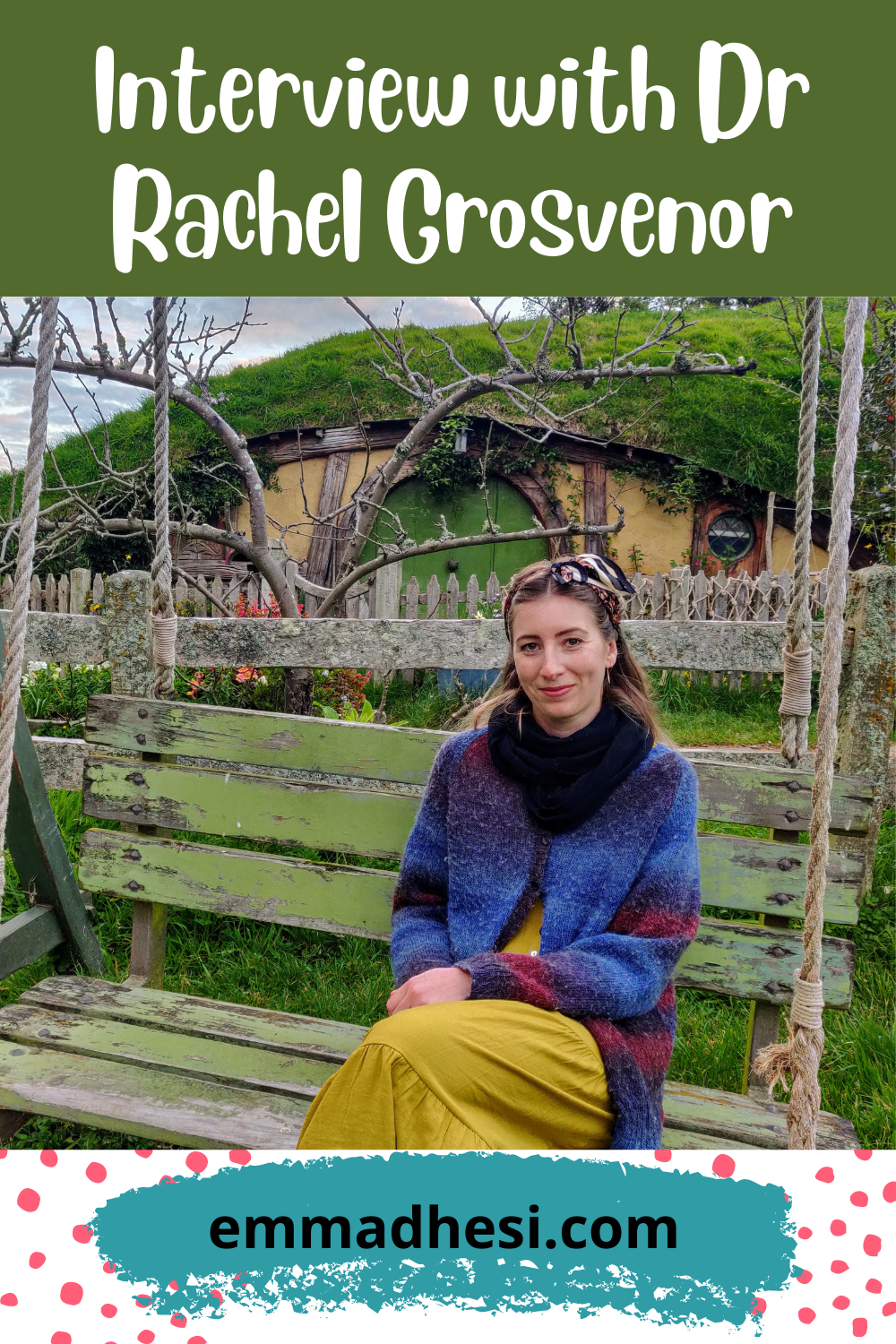
Rachel Grosvenor:
it does depend on my second novel, I had this idea of a it’s about 100 year old woman who’s retired from a university and she basically takes down a totalitarian government. And I love it. I really, she just came to me, you know, this like badass, elderly woman.
He wasn’t going to take no for an answer. You know, she wasn’t done and If they I will say characters come to me first they’ll just be sitting and then I’ll think of someone and be like, I like you, I like you. And I’m gonna see where you go. But I am a plotter.
Okay. So once I’ve got my character, I really sit down and think, Okay, what is going to happen in the story, I really like using the three act method that really helps me. But I, I love to plot because I didn’t plot my first novel, and it was incredibly stressful for me.
And I’m not the kind of person who can just, you know, see what happens, I have to plot it. But even if ideas come to me, I can add them into the plot, you know, it’s not that I’m really rigid, I just need to sit down and work that ahead of time.
Emma Dhesi:
So okay, and so if so you have a kind of loose, overarching knowledge of what’s going to happen in the story? Or do you like to delve down deeper and have more, almost a sort of chapter by chapter knowledge of what’s going to happen?
Rachel Grosvenor:
Yeah, I have a chapter by chapter knowledge. And something I found at university was that I felt like, once I’d got an essay plan essays were essentially written.
And that’s how I feel about novels. So once you’ve got a chapter planets, like, what that’s done, the novel’s written, all I’ve got to do is fill in those gaps. And that really helps me.
So that’s what I do with that. Yeah.
Emma Dhesi:
It’s always interesting how different people work from you know, I think it was I think it was PD, James, I wrote about, read about who should start off with the plot, and then fill in the plot.
And the, the outline got so so detailed, that it became a novel, and it was just kind of joining everything up as she went along. And then other people who just have an idea and fly with it, and then have all the work to do at the back end.
But yeah, this is slightly different. So I want to change tack just a little bit, because one of the, the, the questions I get asked a lot, and one of the things that my audience talk to me a lot about is finding the time to rage.
No, we’re all sorts of so busy now. I always think that since the advent of email, life has just sped up beyond belief, nothing, there’s no time breathing room anymore. So they’re always looking for suggestions, ideas, how to balance that time between family, we’re having a social life, and fitting in the writing.
And so I wondered, how does that work for you? How do you balance your professional life, your writing and your private life?
Rachel Grosvenor:
Yeah, it’s an interesting question, because they don’t teach you at university how to balance time. And that was something I struggled with, you know, when I was doing my PhD, it was full time.
And I was also working two jobs. And I, you know, I had a job in the daytime at the university, and I was teaching creative writing to adults in the evening.
And it was a lot, and I wanted to spend time with my partner, and I wanted to, you know, see my mom and all that stuff. So I, I had to teach myself. And what I learned was, methods that work for me are time blocking, and task batching.
And those are productivity methods that I find really powerful. So time blocking, and task. batching is essentially the act of looking at your calendar, and pulling together tasks and focusing purely on that one task.
So sometimes I think of my attention, like a hose, you know, there’s water coming out, and I need to focus that water in one place only. So my whole calendar is blocked out from you know, it might look like kind of bizarre to some people, it’s got sleeping time in it, it’s got, you know, breakfast time in it, and it’s got reading time in it.
It’s got work time, and it means that I never have to say to myself, Okay, what am I doing next? Because it’s actually planned out for me. I know exactly what to focus on at that time.
\And I know that if I’ve got an hour of writing time and an email pops up, it’s not time to look at emails right now, there is a time to look at emails, but that’s later on, that’s already planned out. So I don’t have to change that direction of water, essentially, from that hose.
I can just keep it focused, time blocking task. Batching has changed my life. And it’s no exaggeration to say that it literally enabled me to complete my studies while working and seeing people that I loved.
And that’s what I still do today. And I will say that this year especially has been the biggest year of personal growth me because I have added into that new planning methods like reverse engineering my goals, and making sure that I have goals for the year and that everything is linked into those set goals.
You know, I literally have four goals for the year I go through my calendar Everything is highlighted to match that final goal.
And if I can’t highlight something, then why am I doing it doesn’t need to be done. And things like that are very powerful. Yeah,
Emma Dhesi:
Yeah. Great. So that’s wonderful. I think that will speak to a lot of people who are just looking for that way to be more productive. But the idea of Yeah, blocking everything out and taking away.
Because once you’ve done that, then you’re taking away a lot of that decision fatigue. And that, oh, what should I do now? franticness that there is no, you know, exactly.
You can move on and do it. I’m going to ask, do you act as being as busy as you are? Do you still manage to write every day or several times a week?
Is that still something that you, you plan for?
Rachel Grosvenor:
Yes, I block out time to write three times a week, I’m not one of those people who writes every day. And I you know, I say to people that I work with, you don’t have to write every day, it doesn’t work for everybody.
And you know what, it just doesn’t work for me. And that’s okay. And it can be stressful. Sometimes, you know, Stephen King’s book on writing, as I write every day, including Christmas Day, including this, including that, I just cannot do that. That is not how I work, and that’s fine.
So, and this is what I say to people, you know, routines have to fit with you, you can try another writer’s routine, but it probably won’t work for you. So it’s alright to say you can write everyday and that is awesome.
I used to work with someone who wrote 1000 words a day, I mean, fantastic. But for me now. So I write about 4000 to 6000 words a week.
Emma Dhesi:
And that’s all though, isn’t it? Because then that’s how that’s how you write a novel. It’s just about being regular or being consistent with it doesn’t have to be all day every day.
Rachel Grosvenor:
Exactly. It’s just like climbing a mountain, you know, you just got to put one foot in front of the other. And sometimes, you know, I’ll sit down and I’ll be like, now I’m gonna write 3000 words. But actually, what comes out is 1000 words, but that’s all right. You know, that’s okay. I know where I’m going with it. And that’s fine.
Emma Dhesi:
Yeah. And, and I wanted to ask you about the creative tap, and whether that also how that helps you and how that helps the students that you work with?
Rachel Grosvenor:
Yes, so the creative tap is all about learning how to turn on creativity.
Basically, it’s about not waiting for inspiration. I think when you start to write a lot of people think that writers, you know, wait for inspiration to hit. But actually, the act of writing means that if you wait for inspiration, you’re probably not going to get much done,
I don’t find inspiration knocks on your door that much, you sort of have to force it. So the creative tap is essentially the act of practicing how to be creative on demand. So what I say to people is, you know, what you want to do is you want to first of all work out one of my most creative, so for me, it’s the morning,
I get most in the morning, some people write in bed at night, and they find that really works for them. Everybody’s different. But once you know that time period, that you’re at your most creative, if you practice being creative during that time, it’s going to be much easier for you to sit down and write.
And I say to people, you know, if you sit down, and actually the words, don’t come try something else, try free writing, try writing exercise. And even if that’s not working, get out a paintbrush, do anything creative for that set amount of time, and you will find that the creative tap is much easier to turn on. So it’s basically a way of teaching creativity. Yeah,
Emma Dhesi:
in training your brain at signs like to just No, I’m just trying to think of an example. You know, like you brush your teeth or whatever, it’s just an automatic thing that you do, you knew that when you go to the bathroom at night, that’s what you’re going to do. And think of a bit more of a better example.
But we do get, we do get used to things and things become second nature. And so when you know that this is when you’re sitting down to write, it’s not a big deal anymore. This is just okay. This is my writing timeless. Yes, a bit of the brain on.
Yeah, absolutely. And I like your suggestion there of even if the music isn’t coming at that moment in time when you sit down, but just to stick with it, to try some different exercises to get a paintbrush out. Try and do something that will start engaging that side of your brain.
Really good suggestion. And so So yes, I’ve mentioned before that you’re not only an author, but you are a book coach, and you’re an editor.
And I thought it might be useful to just differentiate the those two different roles and the part that they play in in shaping and producing a book basically.
So can we start with the book coach, what does the book coach do?
Rachel Grosvenor:
Yeah, absolutely. So as a coach, I basically work with authors on whatever their issues are, essentially. So I find that authors come to me at various stages.
And my most recent author They came to me because she was on, you know, the fifth draft of a novel. And she really wanted to get that finished now, and she was saying, I just need to have some kind of a plan to move forward.
How can I do this? You know, so that’s what we worked on. And, and I get different authors, you know, some people come to me and say, I have an idea, but I don’t know how to turn this into an offer, actually. And then we’ll work on how to do that together.
So it’s everything from Okay, I can’t find the time to write to I’m not really sure what the next step is.
And I’ve got a wonderful client in Australia who had never pitched to an agent before, but she had a meeting. So we had a big coaching session on okay, this is how you, you know, pitch your novel, let’s break it down.
And we rewrote her synopsis into like a pithy, short, five minute talk, and she ended up getting a full manuscript depress, which is really great. So yeah, so yeah, it’s, it’s essentially, whatever your writing issue is, I help people to move forward and find a solution to that.
And coaching is really about the client, you know, it’s about what is going on with them.
So although I have experience in writing, and a background in coaching and things like that, it’s not necessarily about my experiences, it’s all about how I can help them move forward with what they want to do, and investigating deeply into what they believe will help them as well.
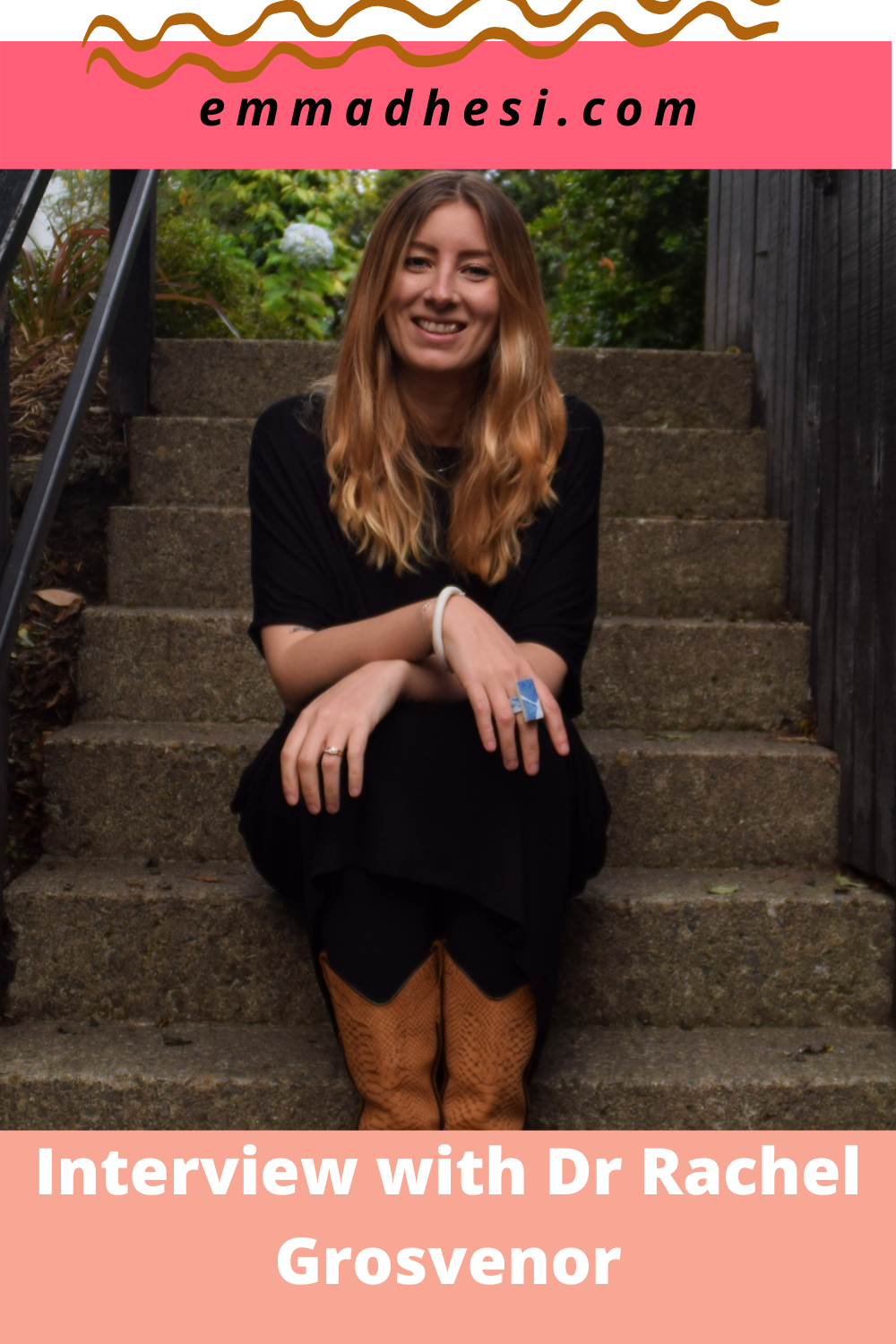
Interview with Rachel Grosvenor:
Emma Dhesi:
Yeah. So the coaching side, as you say, is very much about the person about the author and what they’re going through. But the editing side, then presumably, is more about the the work itself.
Rachel Grosvenor:
Yes, absolutely. So I do developmental editing, copy guessing, I will say developmental editing is my favorite, because I just really enjoy going through a novel. And then I write an editorial report, which, you know, is anything from 12,000 to 25,000 words.
And it’s essentially, it’s a, you know, it’s an in depth essay on their work. And it looks at everything to do with narrative characterization, dialogue, consistency, I go through everything, and then send it back to them. And then we have a coaching session afterwards, once they’ve read it.
And we just discuss, you know, what they think of my comments whether they’ve got any questions and how we can move forward.
So yeah, and copy editing is basically all the other stuff. It’s grammar, it’s, you know, where’s that comma? Is it in the right place?
Emma Dhesi:
Oh, you must have a good brain for detail, I don’t think.
And so I’d love to know, because you, before we started recording, we both mentioned that we we work with coaches, too.
And so I wondered, what are some of the things just from your own experience that you found beneficial from working with a coach?
Rachel Grosvenor:
Yeah, I think it’s so powerful to work with a coach. And I think not a lot of people realize what coaching is, it feels like it’s a fairly new idea.
So people are maybe a bit confused about it. But coaching is very much about working toward the future.
So it’s not so much about the past. And what’s happened, it’s how can you move forward. And in my personal life, working with coaches has just really helped me first of all, in my business, I’ve got a business coach, and she is amazing. And she’s really helped me work out just how to move forward.
And what to do next, because when I started my business, you know, I really had no idea. I’ve been editing and working and coaching under the guise of another company for a while, but I didn’t know how to do this alone.
And I didn’t know anything about marketing really, or anything about that. So she really helped me figure out a path forward.
And also, there’s something amazing to be said, for someone giving you that time to speak. It’s a rare thing that you sit with someone and you have that space, they hold space for you to say anything you like.
And that’s really magical. And it can lead to some incredible realizations.
Emma Dhesi:
Yeah. It’s those intangible things I think is where coaching comes in.
That it’s not the the planning and the strategy and the words or anything, but it’s the kind of the relationship between you and your coach and what comes out of their conversations together.
And those wonderful kind of aha moments that you have, either about yourself and your own attitude to your writing to your work to your family, or about how you want to move forward and the kind of future that you want for yourself.
So I totally agree. I think it’s, it’s a bit hard to kind of quantify it because it’s the moments that you least expect it that the magic happens.
But yeah, so So worth doing. Absolutely. So you mentioned briefly that you’re re editing a book Right now, and but you’re also writing a book right now.
But I know that you’ve been working on something else for, for your audience as well as starting in the new year. So could you tell us a bit about that?
Rachel Grosvenor:
Yeah. So basically, I wanted to offer my audience and clients a way to plan their writing year, because I know that when you are heading into a new year, it can be a bit overwhelming. And you look at your plans, and you’re like, how am I going to do this, this is actually going to happen.
And then you set new year’s resolutions, and you’re like, I’m going to write a novel, but then you kind of forget, and you’re not sure really what that means. So I developed this, it’s called The Ultimate writer’s planning workbook.
And this is exactly what it is. It’s 60 Plus pages of okay, what are your goals, this is how we reverse engineer them.
This is how we fit them into your schedule. This is how you time block, this is how you task batch, this is how your year is going to look. And that’s going to be available from the first to the 15th of January. And it’s essentially just going to be okay, going from, I want to do this.
This is actually how I do it. Now I’ve got a written plan.
And I find that having a written plan and having everything planned out really limits overwhelm and limits those feelings of stress. Because actually, you can just sit down and say, It’s alright, I know what this looks like.
And I know how this is gonna work. And it’s really great to end the year, you know, if you could end 2022, having written that novel, what an awesome feeling that would be,
Emma Dhesi:
it would be. And I’d love that. And so I love that you’re giving people a roadmap to share your techniques in the way that you are so productive and give them those steps and how they can work out for themselves. And the idea of reverse engineering, which I think is quite a lot of people. Yeah, it was certainly new to me when I heard about it.
Rachel Grosvenor:
Okay, yeah, lovely.
Emma Dhesi:
So tell us where can listeners find out more about you. And not only your coaching, but your your fiction as well.
Rachel Grosvenor:
So I am mostly active on Instagram. It’s Rachel Grosvenor author, and also my website as well, which is the same title Rachel Grosvenor author, Grover has a silent s in the middle, which might trip a few people up. But yeah, so that’s, you know, I do blog posts every Thursday.
And they’re about productivity, craft, coaching and publishing.
There’s like a wealth of information there. I offer to PDF booklets on writing as well, just if you sign up to this subscription service, and I send out newsletters and things like that. So I like to, I like to give a lot of information. I spend a lot of time kind of serving. So you know, that’s my why essentially,
I want other people to just be able to write because I think that we can all write if we’ve got that dream. We can all sit down and do it. It’s just about finding a way to do that.
Emma Dhesi:
Wonderful, Rachel, that’s fantastic. Thank you for sharing that with us. And I’ll make sure I linked all of those pieces in the show notes as well. It’s been wonderful learning more about you your writing the work that you do. And so thank you so, so much.
Rachel Grosvenor:
Thanks for having me. It’s been lovely
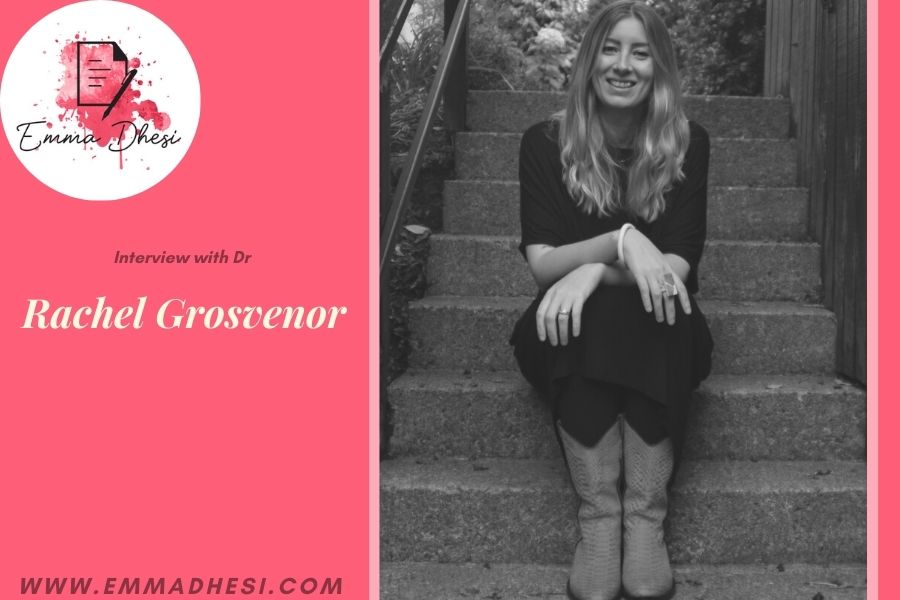
If you’ve been working on your novel for years (perhaps even decades) the maybe it's time to consider working with a coach.
If you have multiple versions of your novel and you don’t know which works best, are scared nobody will like your book and don't feel like a 'real' writer, then my guess is coaching is the right next step for you.
Find out more and sign up for your free Clarity Call here: https://emmadhesi.com/personal-coaching/
If this interview with Rachel Grosvenor was useful, you’ll love:
Shortcuts for Writers


Emma Dhesi
Emma writes women’s fiction. She began writing seriously while a stay at home mum with 3 pre-school children.
By changing her mindset, being consistent and developing confidence, Emma has gone from having a collection of handwritten notes to a fully written, edited and published novel.
Having experienced first-hand how writing changes lives, Emma now helps beginner writers find the time and confidence to write their first novel.


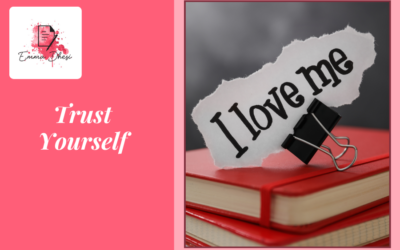

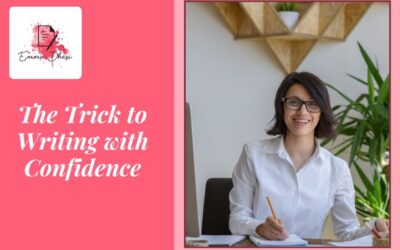
0 Comments